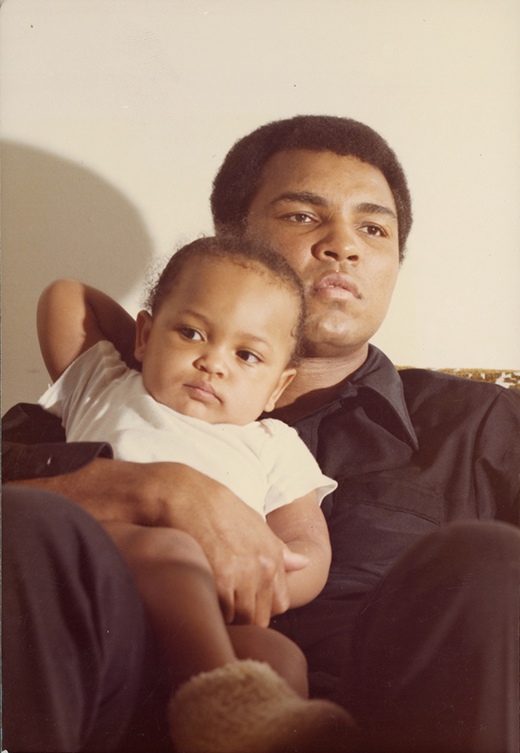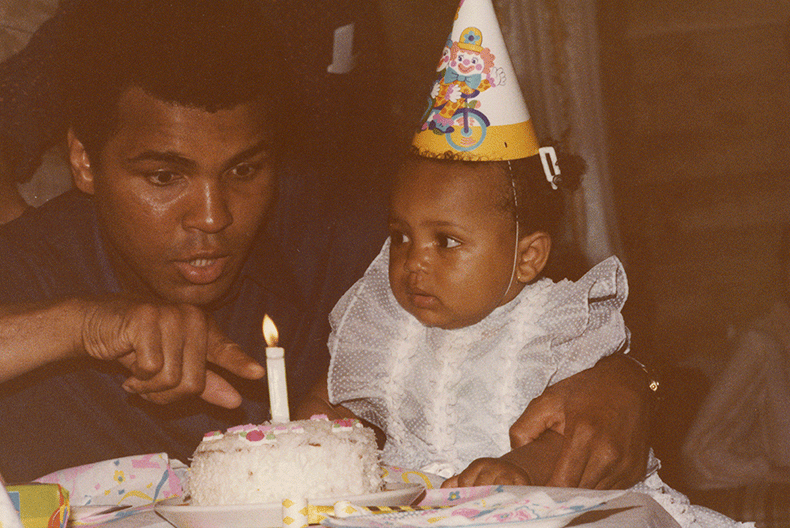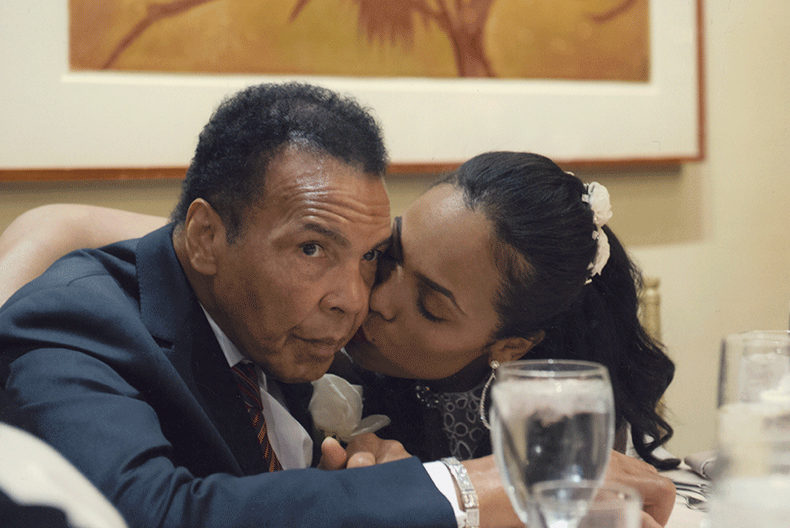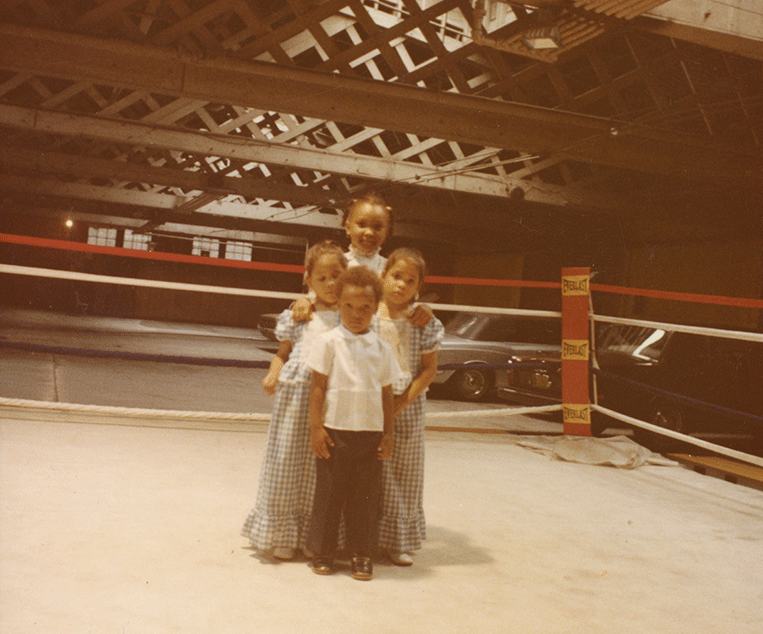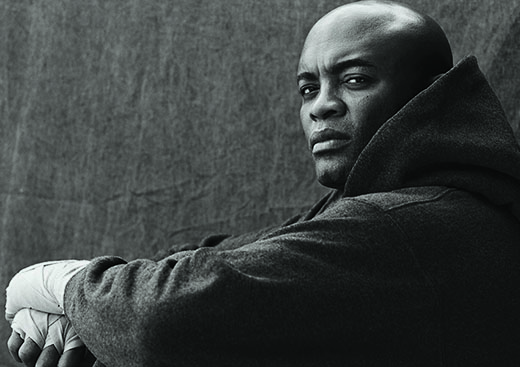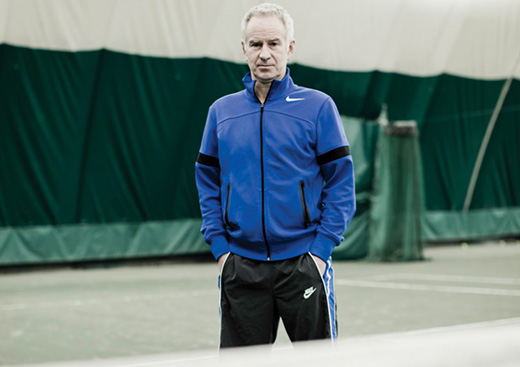Every great person has a story of how they came to be. A moment when their purpose became clear and the journey began. For my father, it happened at the age of 12. One sunny afternoon his bicycle was stolen from a local fair in his hometown of Louisville, Kentucky.
“I was so upset. I had just gotten the bike for Christmas. I walked up and down the street shouting how I was going to find the person who took my bike and give him a good whoopin’,” my father remembers. “A policeman named Joe Martin [who trained boxers at a local gym] overheard me. He said that I better learn how to box before I went challenging anyone to fight.”
And so he did. Every day after school and on weekends, he was the first to enter the gym and the last to leave. “They never found my bike or the person who took it,” he said. With widening eyes, he flashes that old sharp look. “Sometimes I wonder if it was an angel.”
Everyone knows about the 18-year-old Olympic gold medalist who became the world’s greatest champion, winning the heavyweight title for the first of three times at the age of 22. With his remarkable confidence and dazzling speed, he danced around his opponents while rhyming and successfully predicting the rounds in which they would fall.
We all know about his religious conversion when he changed his name to Muhammad Ali and about the stand he took refusing to fight in the Vietnam War on religious and moral grounds. Before entering the induction room on the morning of April 28,1967, he was offered deals—told that he could perform boxing exhibitions and would never see the battlefield—but he refused to compromise his principles.
When the hour of truth arrived, and the name Cassius Marcellus Clay was called at the induction center, Muhammad Ali stood perfectly still. “As I stood there, something was happening to me. It was as if my blood was changing. I felt fear draining from my body and a rush of anger taking its place. Who were they to tell me to go to Asia, Africa, or anywhere else in the world and fight people who had never thrown a rock at me or America? Now I’m anxious for the lieutenant to call my name. I was looking straight into his eyes. ‘Hurry up!’ I said to myself. People in the room were watching in anticipation. ‘Cassius Clay—Army!’ he shouted. The room was silent. I didn’t step across the induction line. ‘Mr Cassius Clay,’ he began again, ‘please step forward and be inducted into the United States Army.’ Again I don’t move. ‘Cassius Clay—Army!’ he says another time. I could hear whispering circulating the room. ‘Cassius Clay—Army!’ he repeated, as though he expected me to make a last-minute change. I stood straight, unmoving.”
He knew there would be consequences, and he was ready to pay the price. When he walked out the door and stood on the federal steps of Houston, he walked into an exile that would eat up what boxing experts regard as “the best years of a fighter’s life.” He would be unjustly stripped of his heavyweight title, banned from boxing, fined thousands of dollars, sentenced to five years in prison, and have his passport revoked. He never wavered in his resolve, and on June 28, 1971, the Supreme Court unanimously overturned his conviction. And we all know about his return to glory, and the legendary fights that followed.
“They can take away the television cameras, the bright lights, the money, and ban you from the boxing ring,” an old man said to my father back home in Chicago, “but they cannot destroy your victory. You took a stand for yourself and the world and now you are the people’s champion.”
“It takes courage to be who you are,” my father says, in reflection. “When most of the world is going in one direction, it takes courage to walk against the crowd. A man who is not courageous enough to take risks in life will accomplish nothing. I’ve accomplished a lot because I took big gambles. I hated every minute of the training, but I said, ‘Don’t quit. Suffer now and live the rest of your life as a champion.’”
“When he first came on the scene, it was like the world had been asleep in one eye,” says the boxer George Foreman, who lost his title to my father in Africa in 1974. “He opened the eye forever and we’ve never been the same.”
If you could borrow my eyes and see my father in the calm of his daily life, you would not mourn what he has lost. When we observe the source of true strength, we find that the power of a hand is best measured not by its weight but by the amount it can lift. My father’s vitality comes from a place deep within. It comes from his courage to fall and his will to rise. It comes from his awareness that every moment under the sun has a purpose and a time. If you could borrow his heart, you would not question what he has sacrificed, but rather pray for the happiness of his further journey on this earth and for the peace of his gentle soul.
The question that my siblings and I are asked most is, “What is it like to have Muhammad Ali as a father?” so I’ll do my best to share and put into words an answer: “It was an expensive price that I had to pay to be the most famous man on earth,” says Muhammad Ali.
By the time I was 4 years old I realized that my father did not belong to me, he belonged to the world. I can remember when I was a little girl, looking down from the top of the staircase at my father’s luggage gathered by the front door. He was preparing to leave for Deer Lake to train for the Larry Holmes fight in 1980. I raced down the steps, as though it was the end of the world. Shouting, “I want to go with you Daddy!” I leapt into his arms and hugged him with all my might. “Please take me with you Daddy!” When he softly told me, “You have to stay home, Hana,” I pushed him away crying. He then walked over to the corner of the room where I lay sobbing on the floor, picked me up and carried me back over to the sofa. He wiped my tears as I sat on his lap and explained, “Hana, I’m your daddy, but I am also Muhammad Ali, the Champion of the World. People all over the world look up to me. I inspire them. So I have to go to Deer Lake to train for a fight that will help me continue to be a champion. I’m not only your daddy, I’m also a ‘daddy’ to the world.” I jumped out of his arms again, sobbing down the hall, into the living room. My father followed me. “Hana, I have to go. Give me a kiss goodbye.” He picked me up. Arm’s crossed, I said, “You’re not my daddy. You’re Muhammad Ali.”
When people achieve great success, something in their lives has to suffer. With nine kids, from different relationships, living in four different states, he could not be present for us all. Dad had Laila and me with his third wife, Veronica Porche. He had Maryum, Jamillah, Rasheda, and Muhammad Jr. with his second wife, Balinda Boyd. And he had Miya and Khalilah with women he was never married to.
Like any family we’ve had ups and downs, sorrows and regrets, happy and unpleasant memories. The difference is we had to share our father with the world. In spite of his busy schedule, all the traveling and having to divide his attention between all of his children, he found a way to make each of us feel loved and cherished.
As my sister Miya remembers, “My father was never married to my mother. So I didn’t grow up living under the same roof with him. But he called me regularly and flew me to Los Angeles, where he brought all of my siblings together for the summers. Since we lived in different states, he didn’t spend a lot of time in my neighborhood or take me to school. After a while, the kids began teasing me, saying that they didn’t believe that Muhammad Ali was really my dad because I didn’t look like him and they never saw us together. Being fair-skinned with fine light hair didn’t help. One day, when I was 8 years old, I called my dad in tears about the teasing. The next day he flew into town and walked me up and down the street so everyone could see us together. He took me to school the next morning, and they called an assembly. When all the students were in the auditorium, he had me point out the kids that had been teasing me. One at a time they walked up to the stage, he shook their hands and told each of them that he was my daddy. That meant more to me than words can explain.”
The Muhammad Ali we knew really wasn’t so different from the one the public saw. As my sister Laila says, “He was and still is a humble man—all of the bragging and boasting was mainly to promote fights and inspire people. What I remember most growing up is how my father’s office door was always open. He would be sitting at his desk, surrounded by friends, fans, hangers-on, etc. talking on the phone or entertaining. I remember Hana and me playing every evening in his den. No matter what he was doing or who was visiting, he would let us play on the floor in front of the fireplace making all the noise we wanted. Sometimes he would sneak out a tape recorder and tape our conversations. Later he would play them back to us explaining how, when we were adults, we would appreciate them. He was right. My dad has always been aware of the value of time. He is an amazing human being that enjoys the simple pleasures of life and knows how to make ordinary moments feel extraordinary. It’s one of his many gifts.”
While most people recognize my father as Muhammad Ali the fighter, in contrast he is really just a sweet, humble, gentle man. Although his voice and movement are not as sharp as they once were, he has a clear mind and pure heart. No matter where he is, his intentions are always the same: to help others.
My dad is truly happiest making people smile. Sometimes the lives he touched were further from home, but he was no less effective. In 1985, he flew to Lebanon in an attempt to secure the release of four hostages. Then in 1990, he flew to Iraq and successfully negotiated the release of 15 American hostages. Stories like these are almost commonplace; he really wanted to make a difference.
Today we are in greater need of heroes like him, especially in a sports culture where athletes seem to be chasing fame merely for the pleasure of making money or breaking records. There is little awareness of the responsibilities that accompany it. For over 50 years, my father has exemplified accountability of fame.
We all admire our own great person and each of us has our own understanding of him or her. My great person is my dad. He has an inner light that transcends his physical body and enables him to reach the furthest corners of the world. He has gentleness in his touch that sets him apart from most. He has a deep spiritual forbearance. He has something open in his heart that can communicate a feeling without employing words, and he enables people to recognize the greatness within them. Most importantly, he is a loving father and an ambassador of peace, hope and good will.
His legacy truly lies beyond his victories in the ring and athletic accomplishments. It encompasses the spirit and sense of possibility that he has inspired in others. The genuineness of his heart, the warmth of his smile, the very gift of himself—his charisma, humanity, and conviction have gained him respect and love from all corners of the globe. Millions of words have been written about him and there are more books that examine the complexity of his character than any other human being.
Today he stands as a beacon of light and hope. He shines through troubled times. Bearing a message of peace and tolerance, the voice of his silence has reached further than his infamous ringside shouts ever did. He is a composite of all the great qualities that can be found in the human spirit. “I’ve lived the life of a thousand men,” he tells me, wide-eyed. “And you’ve loved a thousand times stronger!” I say back to him.
Not too long ago I asked him what he thought about the future of the world. He had this to say: “I can’t predict the future of the world, I’m not that great, but I think the children are going to have to be the ones to change the world. The younger generation does not really know that much about the history of America. They don’t look at each other and see color or religion; they just take each other on face value, for who they are. I think our children can turn things around if they take our mistakes, progress by them and change. It may take another generation or two before a lot of our problems are solved, but it’s going to have to start natural, with the children.” He paused before answering my second question, about what advice he has to offer up and coming athletes. “No matter how famous we get, no matter how wealthy we become, it is only the heart that makes us great or small. Stand up for each other. Speak up for those who cannot speak for themselves and always be true to yourself. When you reach the mountaintop try not to look down at anyone and remember the responsibility that comes with fame. There will be little boys and girls looking up to you—lead them well.”
As long as I can remember, people have told me stories about how my father has changed their lives. They found the courage to face their fear, stand by their convictions, follow their dreams, or simply love themselves. He made them believe that they could do anything and convinced them that they were The Greatest too. The courage and confidence that he inspired in people around the world strengthened the will of a nation as they fought for their human rights. My father passed that inspiration on to his children and grandchildren. With the grace in which he triumphed over difficult times, he refined the standard of a hero and blazed a trail for his family and future generations to follow.
—



